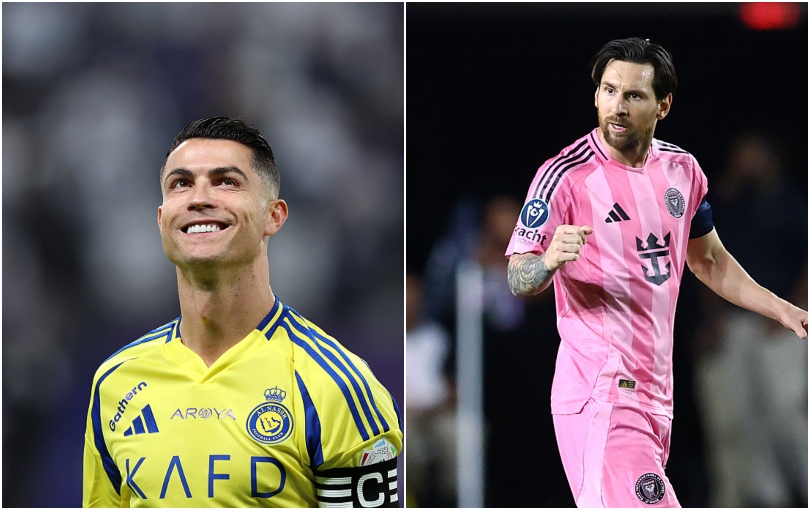Arsenal star Cedric: "Fans have an influence on the team – All Or Nothing is something to learn from"
Do Arsenal players see fans' social media comments? Did Mikel Arteta lose Arsenal their game at Anfield last season? And how does the club approach mental health? Cedric Soares reveals all
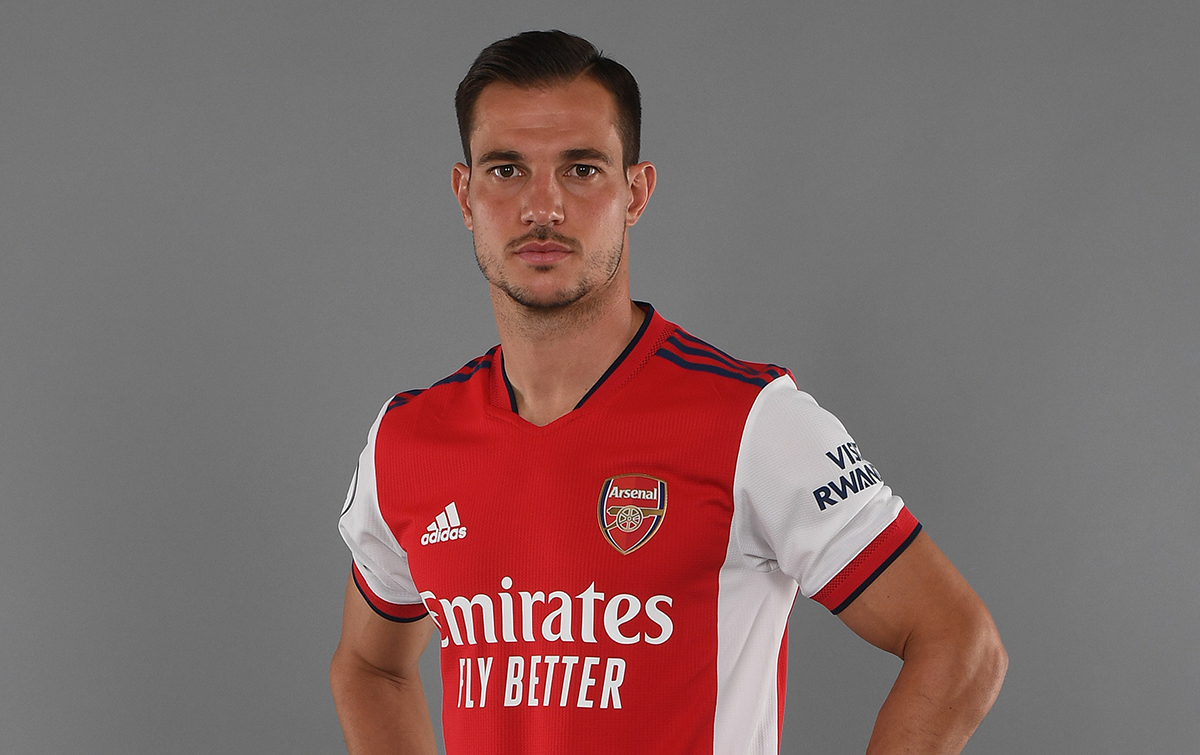
All Or Nothing: Arsenal is the most hotly-anticipated sports documentary of the season – but full-back Cedric Soares can't think of a single moment he's excited to watch back.
We'll forgive him: as he succinctly put it, it was a long old campaign. The Gunners put up an unexpected fight for the top four before crumbling in the final throws of the season. With a new campaign about to begin, this is going to be hard to re-watch for some fans – and even Cedric himself says he's not sure what to expect.
FFT went to the Arsenal training ground to see Cedric for a roundtable of questions on the series, as we got to ask about the experience of being documentary subjects, what Mikel Arteta is really like and – the million-pound question – of what actually happened with Pierre-Emerick Aubameyang last season…
You’ve been filmed for the last year. How did you find the whole experience of Amazon following your every move?
It was definitely something different – especially at the beginning. You’re very aware at the beginning but during the season, you end up forgetting about those cameras, whether they are there, turned on or off. I think it became normal. In the end, it was a good experience – I’m very curious about what is coming! I think it’s something good for the club and something to learn from. I’m excited to watch it.
In the first episode of All Or Nothing, we see Mikel Arteta give a rousing speech before the Norwich game. How important was Mikel during that time in lifting the team into a better run of form?
Of course, we didn’t have the start of the season we wanted – that’s obvious. We had tough games, they were not easy at all but the team was a bit down, which is normal. Mikel tried to bring the group together, it was a good speech and he always tries every week to change the speech and interact with us a bit, get a bit more emotion sometimes, with his plans tactically, which we have to respect. But before we go to the pitch, we have to touch some emotional points. It was good, it was important and it helped to turn the season around.
Get FourFourTwo Newsletter
The best features, fun and footballing quizzes, straight to your inbox every week.
Do you feel like the release of this documentary will bring fans together?
This project, this process has already begun and the fans are much more engaged with the team; the team is much more engaged with the fans, too. I think towards the end of the season, the relationship between the fans and the players becames stronger. They lifted us up; they motivated us and the players tried to give it back to the fans, to start the game with high energy and motivate them as well. I think this relationship has been improving a lot. I think it’s very good and it benefits the players, also. It was impressive towards the end of the season.
When things weren’t going so well, the fans get vocal. Do the players hear that noise?
Well I came, it was COVID: we didn’t have fans. Then we started to have a positive energy around the pitch all the time – we only played one game at home during the difficult period, against Chelsea. But it’s hard to answer. When you’re on the pitch you feel the positive things. When you’re there, they’re vocal. The negativity, sometimes, you don’t understand it.
My point of view is it’s like a ball – if it starts growing with positive energy, it encourages others to be positive and your confidence can help you: you go in for a duel and you win it because you have positive energy. When it’s the opposite, it’s a bit like this. The negativity you can transmit to each other. When we are altogether, we are stronger and I’m quite sure and it actually affects us.
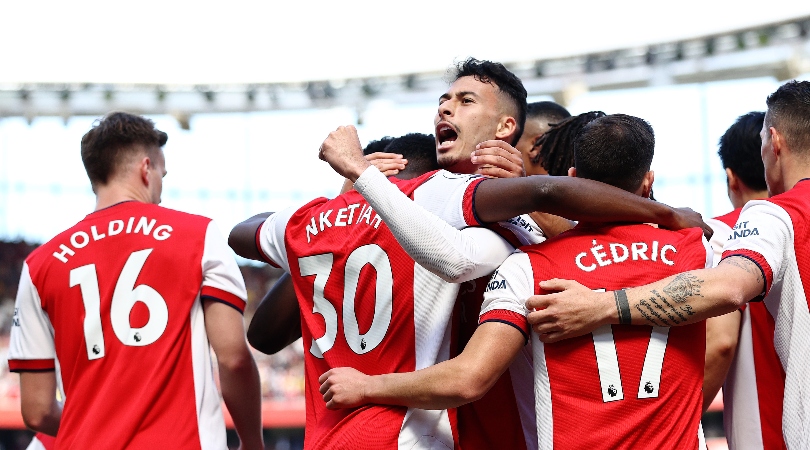
Is there a moment you’re looking forward to seeing in the documentary? Or a moment you’re not looking forward to?
It was a long season! There’s a lot of moments, I don’t know what they cut, what were the important parts for them, what they have on camera. But it was an intense season and in the end, it was a positive one. We had big moments of good momentum. It’s difficult to pick one moment but I’m curious to see the good run and then also the end, we didn’t quite achieve [top four], how [Amazon shows] this part. For us players, it was disappointing but we need to understand that maybe no one expected us to be fighting for that towards the end. It’s about managing expectations but I’m very curious to watch it all.
Mental health is a big theme in the documentary. How do you feel about the club’s approach to that?
It’s a side of football that still isn’t so developed. It’s growing a lot and Arsenal are taking a lot of care of this side. Of course, Mikel cannot pay attention to everyone, there a lot of players. Obviously, the people around him try to do this job. We have some people in just to pay attention to these psychological details. It’s a difficult area. You can be good, you can be bad, maybe you cannot tell. It’s difficult. I’m lucky: I had my family all the time, I grew up with a strong family who helped me to have a strong mentality.
But I have good moments, bad moments, I’m sad, I’m happy but you always need to challenge yourself. When I need to talk, I talk to my family but not all people grew up the same way. Some need different attention and this is sometimes difficult to manage but Arsenal are trying to pay attention to these details. With some they are tougher, others, they are softer. There was analysing individuals. Me personally with [coach] Carlos [Cuesta] too. Sometimes you need to talk about the game, some people do not like to analyse. Me personally, I like to, in good and bad moments, especially when it’s bad.
There was an emphasis on youth in the documentary. How have you found being a more experienced player in the team?
During the season, you have a lot of different moments and the older players try to encourage them, especially in bad moments. When it’s easier, they have a lot of people texting them – I don’t concern myself with them. But when they’ve lost, they have thousands of messages so these are the moments that they need to have the same courage as before – or even more.
You need a bit of experience to come in and help them. Sometimes the experienced players can show them in these moments how to take a risk. Because when everyone is going good and you’re winning 3-0, it’s good. When you have difficult results at the start of the season and you have another game, this is when you need everyone ready, maybe the experienced players try to encourage the players.
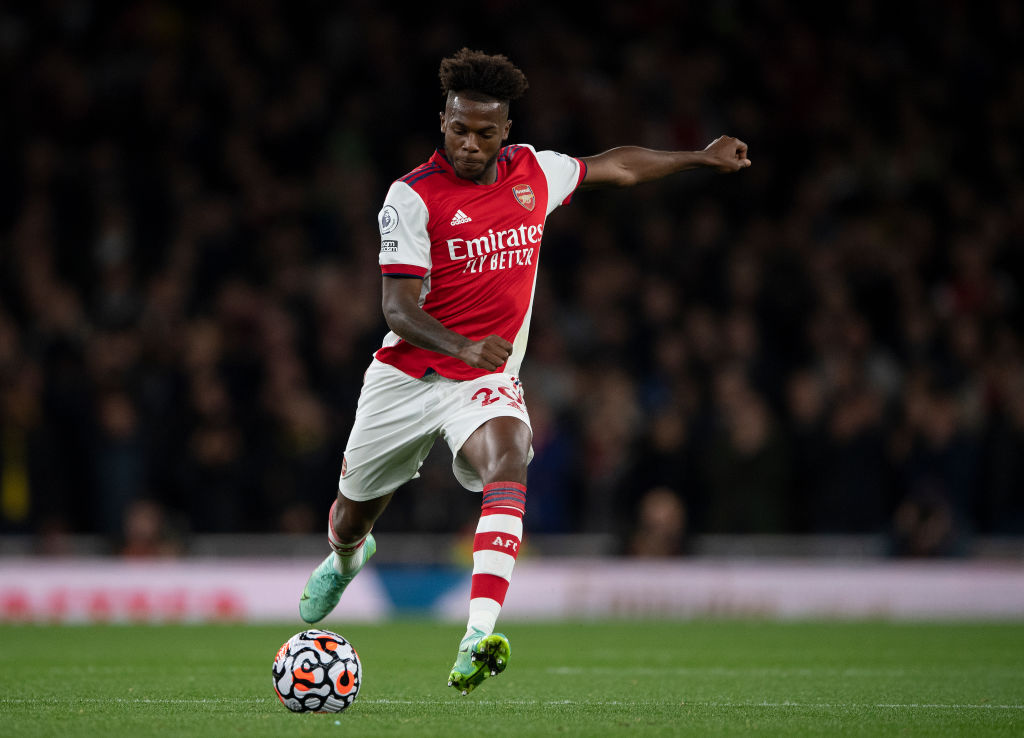
What’s your relationship with young left-back, Nuno Tavares?
Very good. Of course, he talks Portuguese, it makes it easier so I am closer. I tried to help him as much as I could. He has his own way, he has a strong personality and I respect that a lot but I’m very close with him. Anything he needed during the season, I was there, for the bad and for the good. When he was not playing, I would encourage him to keep going and not drop the level in training.
There are things that fans do not see: they see how you perform at the weekend but they do not see the mental side of it, if the player comes from injury or has a bad week. This is not explained. If you are on the pitch, you need to make sure you are ready. So I tried to help Nuno with this. I think he is getting better and I think he is getting more mature.
The game against Liverpool at Anfield… what are your memories of the incident between Arteta and Klopp?
A game we lost, yeah? It was a tackle from someone? [someone tells Cedric it was Mané on Tomiyasu] I remember the small argument. When you are there coaching, you are living the emotion of the game. It is normal, it’s a good thing, not a bad thing. Everyone wants to win, it’s good for the sport.
It's all kicking off... 😡Mikel Arteta and Jurgen Klopp come face to face on the touchline! 📺 Watch Liverpool v Arsenal on Saturday Night Football on Sky Sports pic.twitter.com/dZJgnSefqcNovember 20, 2021
It was suggested that the argument tipped the game towards Liverpool…
We were playing away from home, so it’s normal that it’s a different atmosphere. It’s much better at the Emirates. But Liverpool, Anfield is one of these stadiums where you know the crowd will be there: you have to be prepared for it, the crowd will be helping the team and it’s normal. We as players, it’s part of our job to go there and do what we train for all week. It’s difficult because they have good players but it’s sport, you can’t change it. You have to be prepared.
During the Chelsea game, you were given specific instructions to deal with Romelu Lukaku – are there many players that you have these instructions for?
They do very specific work – of course, not for every game. We normally watch more general play of the opponent because we need to focus on ourselves but when players need this kind of attention, they will say for one or two players, even for the whole defensive unit, how to defend in the box or how to defendin certain moments. After that, it’s your decision.
If you could ask the fans to take one impression from the documentary, what would you like to show the fans?
It’s good for the fans to see that it’s not always an easy life – it’s a demanding life to be a professional footballer in lots of different ways. I think they will understand a bit more this side but it’s also interesting to see the influence they have on the team in a lot of moments. This is great to see. And for them to see the inside of the club, how it works, the every day basics, the demands, the intensity, every session. It’s great, I think.

AMAZON PRIME Get Amazon Prime today and subscribe to watch the documentary of the season
Finally, the big talking point in All Or Nothing: Arsenal may well be the moment that Pierre-Emerick Aubameyang’s captaincy was stripped last season… what happened?
We have to try to give the younger players a good image, of course, and we need to encourage them to do the right things and what works for us. But in the end, every individual will grow. Auba was a situation that I was not involved. I don’t know the details of it – I know more or less what you guys know.
But I was good with him. Obviously, the coach decided that was the best thing to do because from his point of view [Aubameyang] didn’t respect the group in a few moments. If [Aubameyang] is demanding on the pitch, he needs to be demanding [off as well], with a lot of stuff. Like, we know the ideas of the coach, how demanding he is and in a group, there need to be rules and you need to live by them.
More on Arsenal's All Or Nothing: Arsenal documentary
Arsenal's All Or Nothing series drops on August 4 – and we already know some of the details about the show.
In preparation for the release of the documentary, FourFourTwo went along to the Gunners' training ground to speak to some of the stars at the centre of it all. Martin Odegaard has been speaking about his role as a leader in the side and how All Or Nothing: Arsenal will show unprecedented access into the players' lives.
Hale End starlet Emile Smith Rowe was also on hand to chat about the experience, how great it is having his own chant and what it's like to work closely with the coaches at the club.
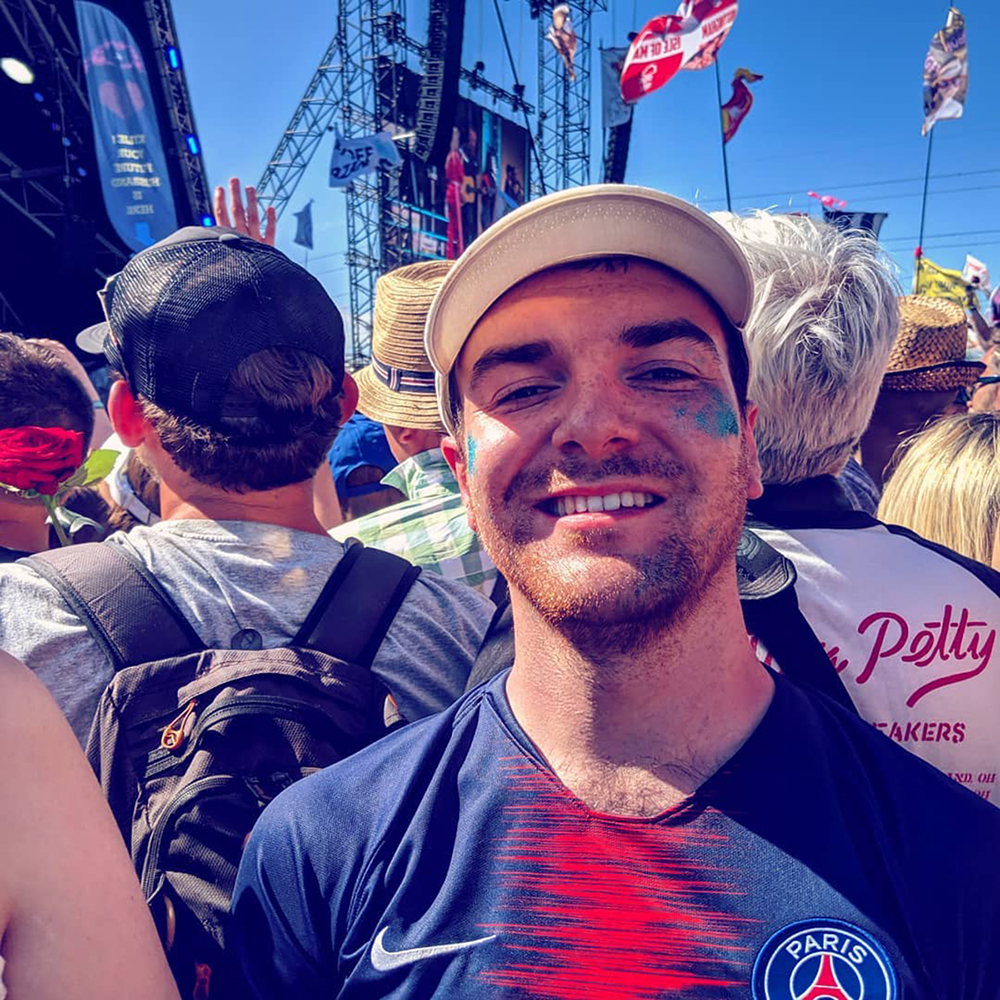
Mark White has been at on FourFourTwo since joining in January 2020, first as a staff writer before becoming content editor in 2023. An encyclopedia of football shirts and boots knowledge – both past and present – Mark has also represented FFT at both FA Cup and League Cup finals (though didn't receive a winners' medal on either occasion) and has written pieces for the mag ranging on subjects from Bobby Robson's season at Barcelona to Robinho's career. He has written cover features for the mag on Mikel Arteta and Martin Odegaard, and is assisted by his cat, Rosie, who has interned for the brand since lockdown.
